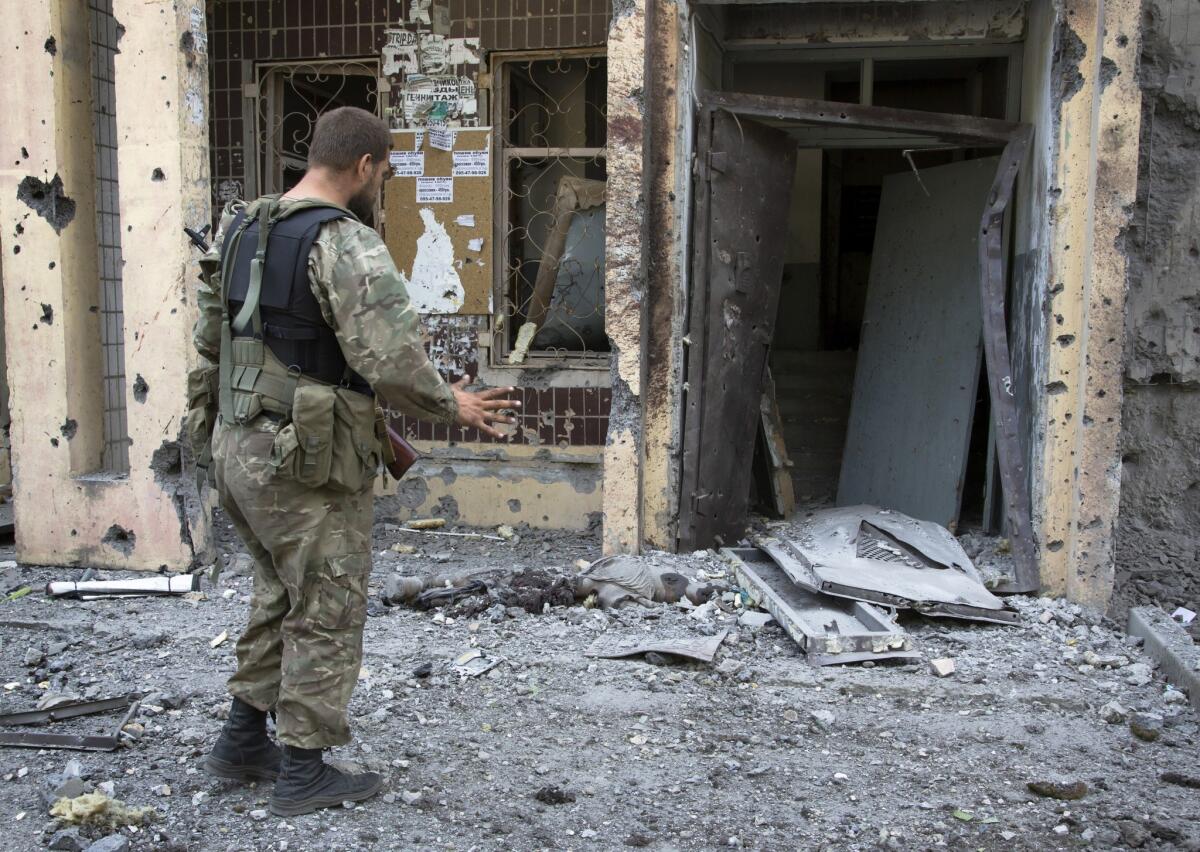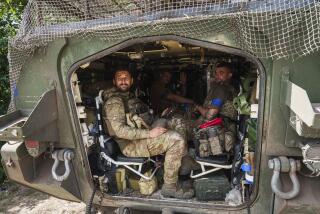Fighting rages in eastern Ukraine; West steps up Russia sanctions

- Share via
Reporting from Kiev, Ukraine — Ukraine’s fight against pro-Russia separatists continued at a feverish pace Tuesday as the European Union and the U.S. moved to toughen sanctions against Moscow.
As battles flared in several eastern Ukrainian cities, the 28-nation EU agreed on stronger economic sanctions that will target sectors of the Russian economy, including energy, finance and defense. The new measures represent a significant step up from the group’s previous actions, which had hit specific individuals and institutions with travel and asset freezes.
“The situation did not leave EU countries with any other option,” Finnish Prime Minister Alexander Stubb said after EU ambassadors signed off on the new sanctions Tuesday afternoon.
In Washington, President Obama lauded the EU decision and announced additional U.S. sanctions designed to work in tandem with the European measures. The United States had pushed for tougher sanctions on Moscow, but European leaders had hesitated for fear of harming their struggling economies.
“Today is a reminder that the United States means what it says,” Obama told reporters at the White House.
The situation with Russia was “not a new Cold War,” he said, but Russia had continued to support separatists in an effort to turn Ukraine into a “vassal state.” Both the U.S. and Europe were determined to make that path a costly one for the Russian government, he said.
The new sanctions will have “an even bigger bite” than those already in place, Obama said, noting that the existing measures have already reduced Russia’s economic growth rate to near zero. Moscow’s actions in Ukraine have isolated Russia economically and politically, “setting back decades of progress,” he said.
Russia has denied training or arming the separatists.
In eastern Ukraine, shelling from Kiev’s forces intensified in the separatist stronghold of Donetsk. North of Donetsk, fighting also continued in the strategic town of Horlivka, where separatists said several civilians were killed Monday.
Battles also raged in Shakhtarsk and Torez in the southern part of the conflict zone and Lutugyno in the more northerly Luhansk region. Government forces appeared to be close to splitting separatist territory in two, with a smaller region anchored by Donetsk on the western end of the conflict zone and a larger area anchored by Luhansk at the eastern end; Donetsk would be cut off from Russian supplies in that scenario. At least 10 Ukrainian soldiers died in battles Monday, an army spokesman said Tuesday.
Ukrainian government forces have made major territorial gains in the last few weeks, but the separatists appear to be digging in. After Kiev captured the southeastern town of Saur Mogila, for instance, separatists sought to retake it several times. Rocket launchers and other weapons appear to be pouring in over the Russian border 15 miles away, as suspected shelling from the Russian side continues.
There may also be a potential change in leadership among the separatists: Oleksandr Boroday, the self-styled prime minister of the so-called Donetsk People’s Republic, has returned to Russia, though separatist leaders said he will soon make his way back to eastern Ukraine. The Russian commander known as Igor Strelkov is thought to remain in a key leadership position.
To put pressure on Moscow, the new sanctions target weapons deals, exports of advanced technology useful for oil drilling and sales of items with both civilian and military applications. Access by Russian state-owned banks to European and U.S. capital markets will also be restricted, which could have a ripple effect throughout the Russian economy.
“It is meant as a strong warning: Illegal annexation of territory and deliberate destabilization of a neighboring sovereign country cannot be accepted in 21st century Europe,” European Council President Herman Van Rompuy said in a statement.
With the latest sanctions, the Obama administration has placed restrictions on five of Russia’s six largest banks, according to U.S. officials who briefed reporters.
In Washington, the new sanctions won an unusual level of bipartisan support. Sen. Marco Rubio (R-Fla.), for example, issued a statement in which he applauded the administration’s move.
Meantime, in eastern Ukraine, a government military offensive could finally be carving out a route to the wreckage site of Malaysia Airlines Flight 17, which was shot down July 17 killing all 298 people on board.
“We have designed a clear-cut path,” Volodymyr Groysman, the deputy prime minister in charge of the site, told reporters in Kiev, saying that the zone could be secured as soon as Wednesday.
Safety concerns prevented more than 60 investigators from Australia and the Netherlands from reaching the site of the downed jet for a third straight day. The team has had several false starts since attempting the journey Sunday and did not succeed in leaving Donetsk for the site Tuesday.
Zeitchik reported from Kiev and Chu from Luxembourg. Times staff writer Kathleen Hennessey in Washington contributed to this report.
Follow @ZeitchikLAT on Twitter
More to Read
Sign up for Essential California
The most important California stories and recommendations in your inbox every morning.
You may occasionally receive promotional content from the Los Angeles Times.












